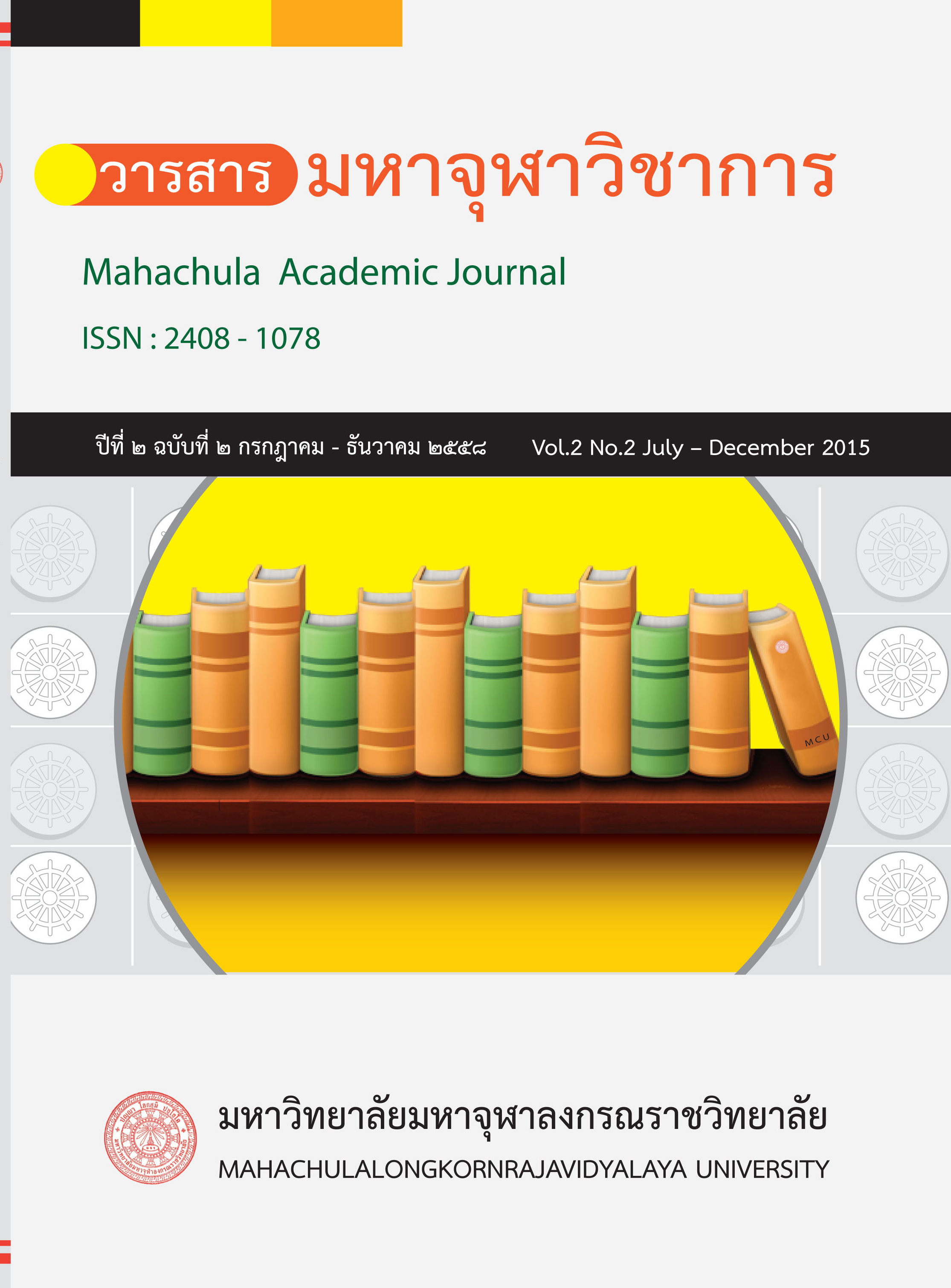Ethical Value of Deva affecting the Development of life
Main Article Content
Abstract
This research consists of 2 objectives; to study the status and roles of gods (deva) in nature and Buddhism, to study ethical value to the development of life in Thai society. It is the documentary research in Tepiṭaka as the primary source.
It was found that there are three kinds of gods, namely:- gods by rebirth, gods by purification, gods by convention. The gods by rebirth have status, existence, according to sphere/heaven, according to age, according to birth/death, according to life/rebirth, according to food, according to relation with a human. The gods are grouped in three kinds, namely;- the kinds of roles in gods for Buddhism and nature. The kinds of rituals concerning with gods. The kinds of gods in heaven and the status and roles of gods for nature and Buddhism. The gods who produce the ethical values to human concluding monks and Buddhists. The gods is the important point of Buddhism. The Buddha regards the Buddha’s one of routines in five ones, it is the reply of question for Deva at time in noon night.
The morals of gods as Dhamma for being deva:- 1. Three bases of meritorious action (Puññakiriyãwatthu) 2. Ten bases of meritorious action (Puññakiriyãwatthu 3. Five Achievement (Sampadã) 4. Two titles in ethics of gods (Devadhamma 5. the seven principles for practice of gods (Wattapada).
The morality of gods develops their lives caring to each others arised peace in society and nature. In which, the god of forest follows rukkhadhamma, the gods of sky delete the lunar eclipse by speech in the Buddha’s virtues, the god of rice care of vegetation, the god of water saves it, the god of rain gives rain in right season. The gods teach Dhamma to human and the human resides with the gods by making merit, making gift, making good, making of the ritual of good worship and ethical treatment.
The gods give ethical values to society. The morality of gods is the morality for the development of life, helping each others, the arise of peace in society and nature. The morality of gods has the value to knowledge, to moral source, to memorial, to relation of forest, to changing one’s bad fortune, to pledge, to happiness. These values of gods are the benefit for followers, because they are empower in their minds being hopefulness without carefullessness. The next point of their lives is heaven. Finally, they are free from suffering and finding peace in one’s own life.
Article Details
References
ิธิ เอียวศรีวงศ์. พระพุทธศาสนาในความเปลี่ยนแปลงของสังคมไทย. กรุงเทพมหานคร: สำนักพิมพ์มูลนิธิโกมลคีมทอง ๒๕๔๓.
พระครูสิริรัตนานุวัตร. เรื่องนามว่าอินเดีย..., รวมบทความ. พิษณุโลก: โรงพิมพ์โฟกัสมาสเตอร์ปริ้นต์, ๒๕๓๔.
พระครูสิริรัตนานุวัตร. “คุณค่าทางจริยธรรมในประเพณีสงกรานต์”. รายงานการวิจัย. มหาวิทยาลัยมหาจุฬาลงกรณราชวิทยาลัย, ๒๕๕๕.
พระครูสิริรัตนานุวัตร. “การบนบาน บวงสรวง : แนวคิด หลักการและอิทธิพลต่อสังคมไทย”. รายงานการวิจัย. มหาวิทยาลัยมหาจุฬาลงกรณราชวิทยาลัย, ๒๕๕๕.
พระครูสิริรัตนานุวัตร. “พระพุทธศาสนากับศิลปะนะวัตกรรม”. วารสารมหาจุฬาวิชาการ. ปีที่ ๑ ฉบับที่ ๑ (มกราคม–มิถุนายน ๒๕๕๗).
พระธรรมปิฎก (ป.อ. ปยุตฺโต). พุทธธรรม. กรุงเทพมหานคร: โรงพิมพ์มหาจุฬาลงกรณราชวิทยาลัย, ๒๕๔๓.
พระธรรมปิฎก (ป.อ. ปยุตฺโต). พุทธวิธีในการสอน. พิมพ์ครั้งที่ ๖. กรุงเทพมหานคร: บริษัท โอเอ็นจีการพิมพ์จำกัด, ๒๕๔๒.
พระธรรมปิฎก (ป.อ. ปยุตฺโต). คนไทยหลงทางหรืออย่างไร. กรุงเทพมฟานคร: สำนักพิมพ์ มูลนิธิพุทธธรรม, ๒๕๓๘.
พระพรหมคุณาภรณ์ (ป.อ. ปยุตฺโต). ปรากฏการณ์จตุคามรามเทพ ๒๕๕๐ เมื่อเทพมาเยือนเมืองคอน. กรุงเทพมหานคร: โรงพิมพ์กรุงเทพ, ๒๕๕๐.
พระมหาทวี ฐานวโร. พุทธวิธีเทศนาแบบต่าง ๆ. พิษณุโลก:โฟกัสมาสเตอร์ปริ้นต์, ๒๕๔๙.
พระราชวรมุนี, (ประยูร ธมฺมจิตฺโต). อนุทินธรรมะ : ธรรมสำหรับ ๓๖๕ วัน. กรุงเทพมหานคร: สำนักพิมพ์มูลนิธิพุทธธรรม, ๒๕๓๙.
มหาจุฬาลงกรณราชวิทยาลัย. พระไตรปิฎกภาษาไทย ฉบับมหาจุฬาลงกรณราชวิทยาลัย. กรุงเทพมหานคร: โรงพิมพ์มหาจุฬาลงกรณราชวิทยาลัย, ๒๕๓๙.
สมคิด สวยล้ำ,พันตรี. “การศึกษาวิเคราะห์หลักธรรมจากการตอบปัญหาเทพของพระพุทธเจ้า”. ปริญญานิพนธ์พุทธศาสตรมหาบัณฑิต. บัณฑิตวิทยาลัย: มหาวิทยาลัยมหาจุฬาลงกรณราชวิทยาลัย, ๒๕๕๓.
สุชีพ ปุญญานุภาพ. พระไตรปิฎกฉบับสำหรับประชาชน. พิมพ์ครั้งที่ ๑๔. กรุงเทพมหานคร: โรงพิมพ์มหามกุฏราชวิทยาลัย, ๒๕๓๕.
Tich Nhat Hanh. Look Deep and Smile; Buddhism and Ecology. Edited by M. Batchelor, Delhi: Motilal Paranasidas, 1994.
Phramaha Sirivat, Wongsa. The Concept of Devas as Depicted in Suttantapitaka. Ph.D. Dissertation, Pune, India: University of Pune, 2006.
Leopold Aldo. A Sand County Alamanac. New York: Oxford University Press, 1966.


